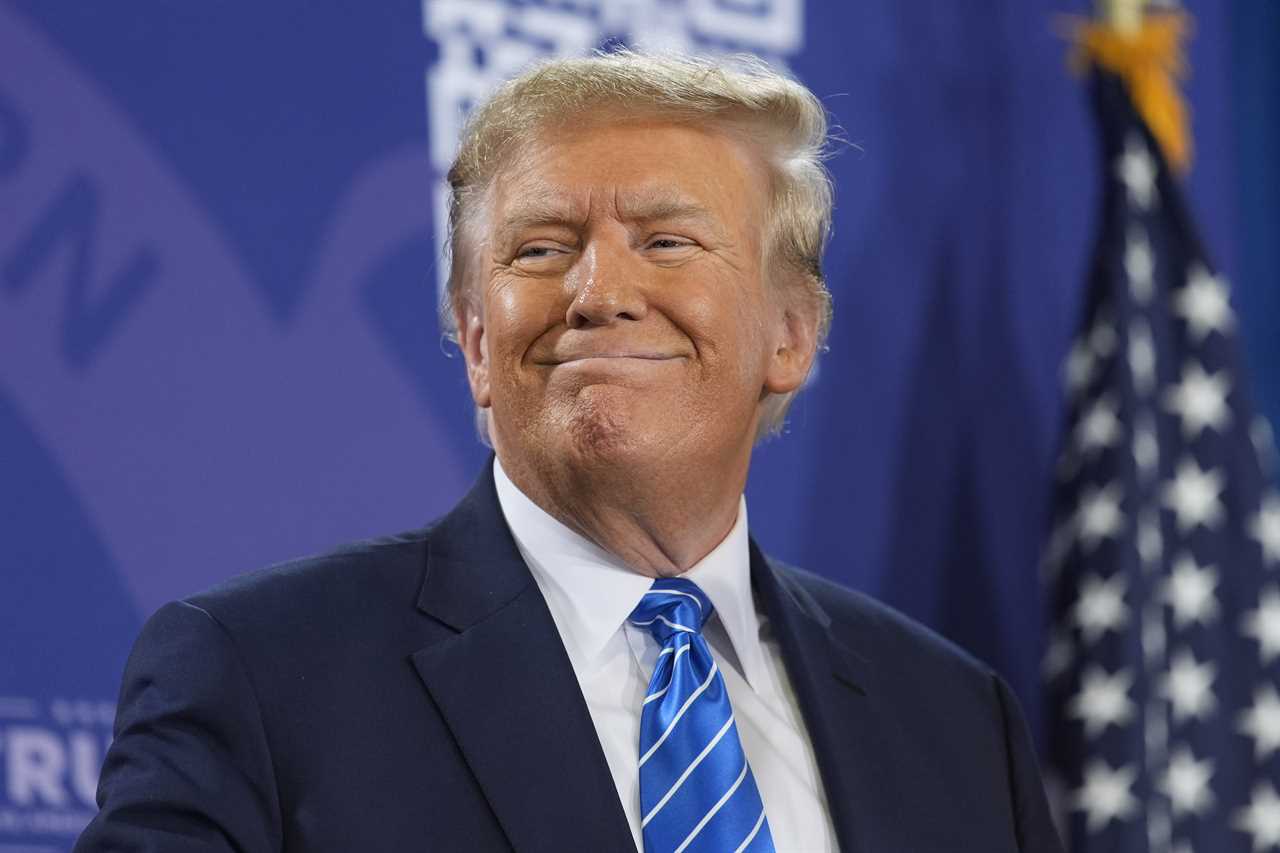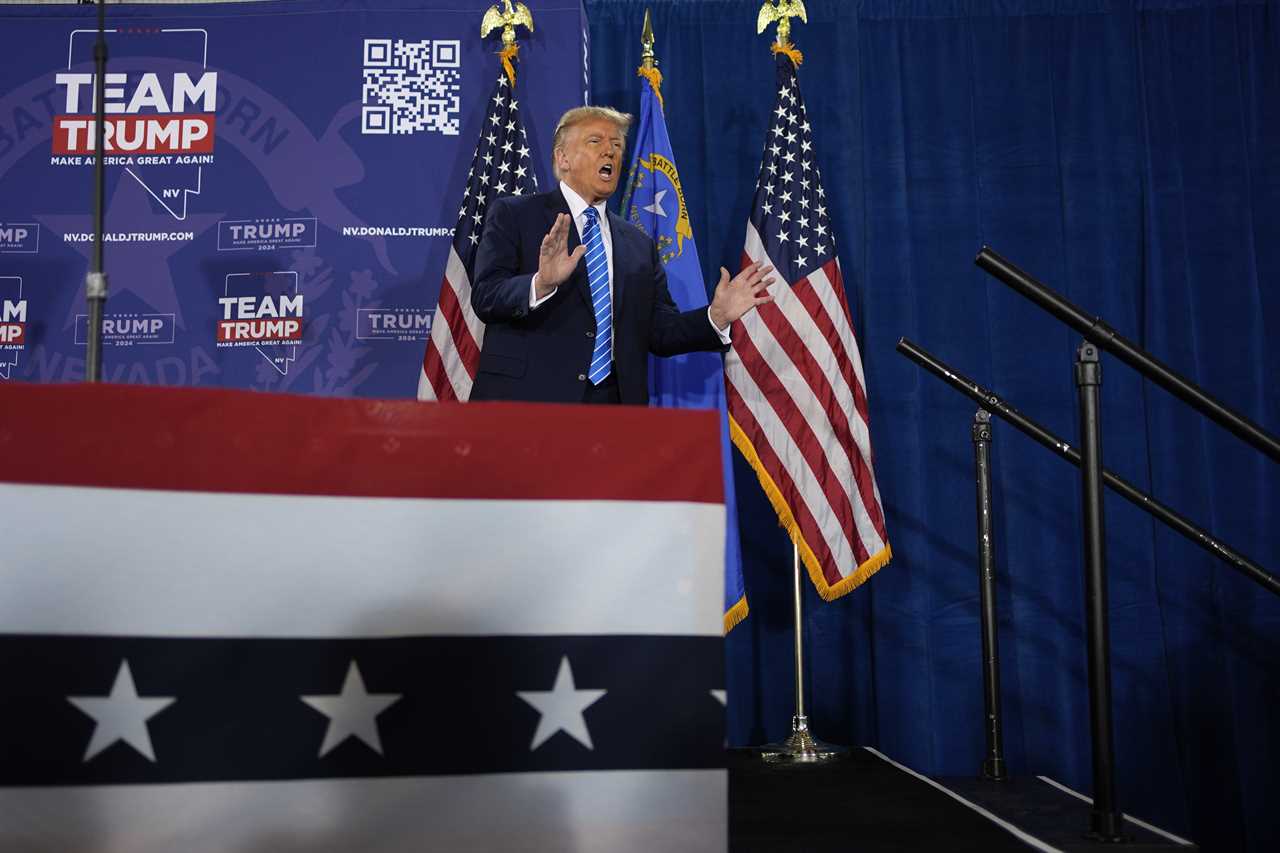
Whether Donald Trump faces a potential prison sentence in 2024 is at the mercy of a federal appeals court that’s operating on its own schedule — at a time when every day matters.
More than 50 days have elapsed since Trump’s criminal proceedings in a Washington, D.C., trial court — on charges for attempting to subvert the 2020 election — were paused indefinitely. They won’t resume until the D.C. Circuit Court of Appeals and, most likely, the Supreme Court resolve the question hanging over the entire case: whether Trump, as a former president, is immune from criminal prosecution.
Even if those courts ultimately reject Trump’s immunity arguments — an outcome that most legal experts expect — the protracted delays help the former president, whose strategy across his various trials has been to drag them out for as long as possible. Lengthy delays in his federal criminal cases create the possibility that, if he wins the presidency this November, Trump could avoid the charges altogether by having the Justice Department end the prosecutions or perhaps even by pardoning himself.
U.S. District Judge Tanya Chutkan, who is overseeing Trump’s federal election case, has tried to keep it on an expeditious track, and the trial is officially slated to begin on March 4. Chutkan, though, has strongly suggested she’ll push back that start date to account for each day of delay caused by Trump’s immunity appeal.
Even if the appeal were resolved this week against Trump, that calculation would put his earliest trial date in late April. But if the D.C. Circuit and the Supreme Court take additional weeks or months to deliver a final ruling, the opening days of Trump’s trial could be pushed to the summer or fall.
If, at that point, Trump retains his grip on the 2024 GOP presidential nomination, he and his allies are certain to exert intense pressure to postpone the trial until after the election. Chutkan, an Obama appointee, could plow forward with a trial anyway — and she’s repeatedly indicated that the campaign calendar has no bearing on her own.
But doing so would require Trump to sit in a courtroom for weeks during the heart of the campaign. Trump has already used his crowded legal calendar as a campaign cudgel to raise funds and rally supporters by claiming to be the victim of political prosecutions and lawsuits.
For now, the timing of the case remains in the hands of a three-judge panel of the D.C. Circuit, which heard arguments on the immunity issue on Jan. 8. That reality has placed immense power in the hands of a few judges guided by opaque internal procedures, seniority and norms of collegiality that make reliable prediction impossible.
Many legal experts had expected the D.C. Circuit panel to rule quickly after the arguments, perhaps within a few days. But for more than three weeks, the court has been silent. There’s no required deadline for a ruling.
“The timing of a decision by the panel will indeed be a critical determinant of whether the case can go forward expeditiously,” said Daniel Richman, a Columbia University law professor.
Richman said Trump’s arguments for immunity were so “outlandish” that the appeals court should have little trouble rejecting them. But he said the court must take its time to issue a careful ruling because of the certainty Trump will keep pressing his immunity claim.
“Quite a few stars would have to align before the trial can proceed,” Richman said.
If those stars do align, the timing will be crucial. Special counsel Jack Smith has estimated that his case would take nearly two months to present, and Trump is almost certain to present a defense that could add additional weeks to the timeline. That raises the prospect of Trump being required to spend the duration of the Republican National Convention — or even Election Day itself — in a courtroom.

Or, if the Supreme Court agrees to hear Trump’s bid for immunity but won’t take up his appeal on an emergency basis, the trial could remain on hold until after the election. And if Trump wins, he would be virtually certain to shut down the case.
The three-judge D.C. Circuit panel initially appeared to be moving swiftly: It took up the matter on an emergency basis in December and held oral arguments a few weeks later, a lightning-quick schedule for the typically plodding court.
The judges seemed poised to reject Trump’s sweeping immunity claim at the time. But the precise contours of their ruling were less obvious, and it’s possible the judges could splinter over the details, further delaying the ruling.
The urgency of ruling to the prosecution has drawn unusual scrutiny of the internal machinations of the appeals court, such as whether a single judge — perhaps Karen Henderson, an appointee of President George H.W. Bush — could prevent the ruling from coming out quickly, even if the panel’s other two judges — Florence Pan and Michelle Childs, appointed by President Joe Biden — are ready to rule.
Henderson, the panel’s senior judge, had expressed opposition to taking up the case on an expedited basis and also had the most cryptic outlook based on her questions during oral arguments. As the most senior judge, she has the right to write the majority opinion if she’s in the majority. And even if she disagrees with her colleagues, she could potentially hold back the court’s ruling for weeks or months while she crafts a dissenting opinion.
There is no formal rule or policy at the appeals court that allows the majority on a panel to force the release of a ruling when another member of the panel hasn’t completed his or her opinion, according to Matthew Seligman, a former D.C. Circuit law clerk who is co-counsel on a friend-of-the-court brief in the case filed by former Republican officials opposing Trump’s immunity claim.
“At this point, it’s uncomfortable how long it’s taken, but I don’t think you can look at it and say it’s, on its face, absurd,” said Seligman, who said judges in the majority would likely wait much longer before trying to cajole or force the release of a ruling while a colleague is still writing. “I don’t think we’re really close to a point where the judges in the majority would consider taking whatever measures they could — and it’s not clear what those are.”
The time it takes for the appeals panel to mull over the weighty question could also influence the likely Supreme Court battle to follow. If Trump loses at the appeals court, he’s already announced his intention to seek the high court’s judgment and has begun a public campaign to persuade them to endorse a boundless definition of presidential immunity. The longer it takes for the appeals court to rule, the likelier the Supreme Court would punt the issue into the fall — effectively ruling out a trial before the election.
That’s why the timing of the D.C. Circuit’s opinion could bear heavily on whether Trump sees a criminal trial that carries the risk of jail time in 2024.
Trump is facing three other criminal cases: one brought by Smith in Florida in which Trump stands accused of hoarding national security secrets at his Mar-a-Lago estate after leaving office; one in Georgia brought by local prosecutors who say Trump conspired to subvert the presidential election there in 2020; and one in New York brought by the Manhattan district attorney, who says Trump falsified his company’s records to mask hush money payments he made to conceal an alleged affair with a porn star.
A trial in the New York case is officially slated to begin in late March, though Trump is still pushing to toss it altogether, and even if it moves forward, the anticipated punishment is expected to be minimal. The Georgia case has not yet been scheduled but is likely to be shunted to 2025, given its complexity and laundry list of unresolved issues. And the classified documents case in Florida, set for May 20, also appears likely to be pushed back as U.S. District Judge Aileen Cannon, a Trump appointee, has extended key pretrial deadlines.
The pause in the proceedings in the election-focused case in Washington began on Dec. 7, when Trump appealed Chutkan’s conclusion that neither he — nor any former president — enjoys immunity from criminal prosecution. And Chutkan has acknowledged that as long as the immunity question remains unresolved, Trump is under no obligation to continue preparing for trial.
----------------------------------------
By: Kyle Cheney and Josh Gerstein
Title: As judges mull presidential immunity, Trump reaps the benefits of delay
Sourced From: www.politico.com/news/2024/01/31/trump-trial-immunity-delay-00138688
Published Date: Wed, 31 Jan 2024 05:00:00 EST
Did you miss our previous article...
https://consumernewsnetwork.com/politics-us/the-primary-season-is-over-it-shouldnt-be






